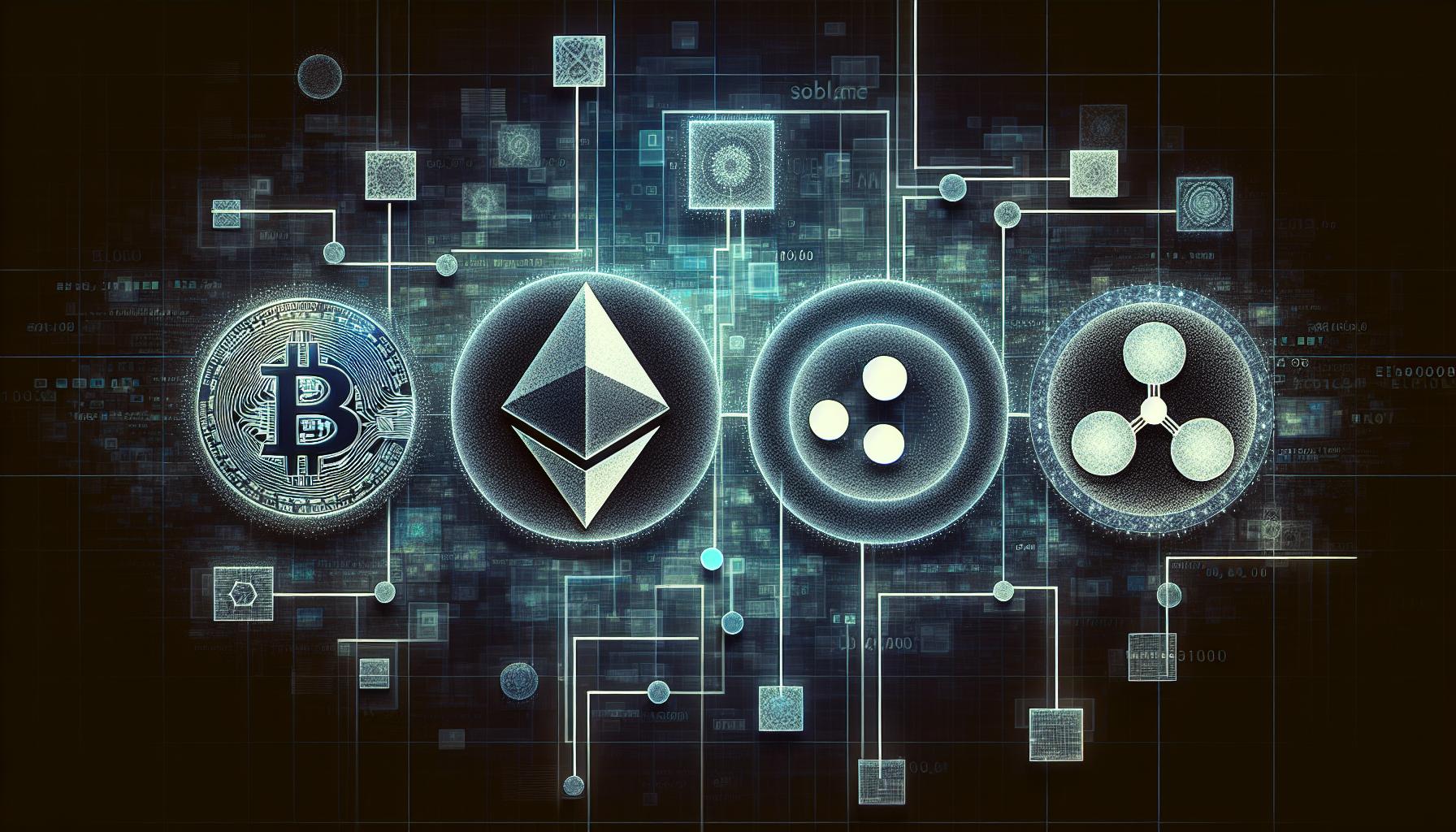If you’re curious about the landscape of competitors in the world of ICP tokens, you’ve come to the right place. In this article, we’ll explore the key players vying for attention and market share alongside ICP. From established names to emerging contenders, the competition in the ICP token space is fierce and dynamic.
As you delve into the realm of ICP token competitors, you’ll discover a diverse array of projects and platforms aiming to make their mark in the decentralized ecosystem. Understanding who these competitors are and what sets them apart is crucial for investors and enthusiasts looking to navigate the evolving landscape of blockchain technology.
Whether you’re a seasoned investor or a newcomer to the world of cryptocurrencies, gaining insights into the competitive field surrounding ICP tokens can provide valuable perspective on the opportunities and challenges shaping the future of decentralized finance.
Overview of ICP Token
When considering the competitive landscape of ICP tokens, it’s essential to evaluate the existing competitors in the decentralized ecosystem to make informed decisions about investments. By understanding the strengths and weaknesses of these competitors, you can gain valuable insights into the market trends and position of ICP tokens.
Understanding ICP Token Competitors
- Ethereum (ETH): As one of the most established players in the decentralized finance space, Ethereum competes with ICP tokens in terms of smart contract capabilities and decentralized applications.
- Binance Coin (BNB): Binance Coin serves as a utility token on the Binance Smart Chain, offering fast and low-cost transactions similar to ICP tokens. It’s known for its robust ecosystem and user-friendly interface.
- Solana (SOL): Solana has emerged as a strong competitor with its high throughput and low transaction fees, aiming to provide scalability and efficiency in decentralized applications like ICP tokens.
- Cardano (ADA): Cardano focuses on sustainability, scalability, and interoperability, challenging ICP tokens in the race for a more inclusive and secure blockchain network.
- Polkadot (DOT): With its innovative approach to interoperability and scalability, Polkadot offers a competitive edge to ICP tokens by enabling diverse blockchains to work seamlessly together.
Evaluating the Competition
Each of these competitors brings unique features and functionalities to the table, influencing the decentralized finance landscape and affecting the growth potential of ICP tokens. By staying informed about the offerings and developments of these competitors, you can better assess the market dynamics and make strategic decisions regarding your involvement with ICP tokens.
Considering the competitive environment and the evolving nature of decentralized technologies, it’s crucial to keep track of the progress and updates from both ICP tokens and its competitors to navigate the digital assets space effectively.
Major Competitors of ICP Token

When evaluating the competitive landscape of ICP tokens, it’s essential to consider major players in the decentralized ecosystem. Understanding the strengths of these competitors can provide valuable insights for your investment decisions. Here are some of the key competitors of ICP tokens that you should keep an eye on:
- Ethereum
Ethereum is a formidable competitor in the decentralized finance space. Known for its smart contract functionality and vibrant ecosystem, Ethereum offers a wide range of decentralized applications and has a strong community backing. Its established presence and network effects pose a significant challenge to ICP tokens. - Binance Coin
As the native token of the Binance ecosystem, Binance Coin is another strong competitor. With various use cases within the Binance platform and the Binance Smart Chain, BNB has gained popularity among users and developers. Its utility and integration across different Binance products make it a noteworthy competitor to ICP tokens. - Solana
Solana has emerged as a high-performance blockchain platform, known for its fast transaction speeds and low fees. The scalability and efficiency offered by Solana make it a compelling alternative for decentralized applications, potentially impacting the market position of ICP tokens. - Cardano
Cardano is recognized for its focus on sustainability, scalability, and security. With a strong emphasis on peer-reviewed research and development, Cardano aims to provide a robust framework for decentralized applications. Its innovative approach and long-term vision pose a competitive threat to ICP tokens. - Polkadot
Polkadot stands out for its interoperability features, enabling different blockchains to seamlessly connect and share information. This cross-chain compatibility and scalability appeal to developers looking to deploy decentralized applications across multiple blockchains, offering a unique value proposition that competes with ICP tokens.
By staying informed about these major competitors of ICP tokens, you can better navigate the dynamic decentralized finance landscape. Each of these competitors brings unique strengths and features to the table, influencing the market dynamics and shaping the future of digital assets. Understanding how these projects compete and differentiate themselves is crucial for making informed decisions in the evolving crypto space.
Unique Selling Points of ICP Token Competitors
When evaluating ICP token competitors, it’s essential to consider their unique selling points that differentiate them in the decentralized ecosystem. Understanding what sets these competitors apart can provide valuable insights for making informed investment decisions.
Ethereum
- Smart Contract Platform: Ethereum pioneered smart contracts, enabling decentralized applications (dApps) to run on its blockchain.
- Largest Developer Community: With a vast network of developers, Ethereum offers a rich ecosystem of tools and resources.
- Established Market Presence: Ethereum’s long-standing reputation and adoption make it a preferred choice for various decentralized projects.
Binance Coin
- Utility Token on Binance Exchange: Binance Coin serves as the native token for the Binance exchange, offering various utilities and discounts.
- High Transaction Speeds: Binance Smart Chain’s network is known for its fast transaction processing and low fees.
- Interoperability: Binance Coin’s interoperability with other blockchains enhances its connectivity and usability.
Solana
- High Throughput: Solana boasts one of the highest transaction speeds in the industry, capable of processing thousands of transactions per second.
- Low Transaction Costs: Solana’s efficient blockchain design keeps transaction costs minimal, appealing to users seeking cost-effective solutions.
- Innovative Technology: Solana’s unique Proof of History consensus mechanism sets it apart as a high-performance blockchain platform.
Cardano
- Sustainable and Scalable: Cardano focuses on sustainability and scalability, aiming to address inherent issues in existing blockchain networks.
- Academic Approach: Developed by leading academics and engineers, Cardano leverages scientific research to drive its development.
- Focus on Security: Cardano places a strong emphasis on security and formal verification, enhancing trust and reliability.
- Interoperability and Scalability: Polkadot’s multi-chain architecture enables interoperability and scalability across different blockchains.
- Governance and Flexibility: Polkadot’s governance model allows for upgrades and changes without hard forks, promoting adaptability.
- Cross-Chain Communication: Polkadot’s parachain technology facilitates seamless communication between different blockchains within its ecosystem.
Market Share Analysis
When evaluating the market share of ICP token competitors, it’s essential to consider various factors that can impact their positions within the decentralized ecosystem. Key competitors such as Ethereum, Binance Coin, Solana, Cardano, and Polkadot each have unique strengths and offerings that contribute to their market dominance.
Ethereum
As one of the earliest smart contract platforms in the market, Ethereum has a significant advantage with its large developer community and established presence. Ethereum’s market share remains robust despite increasing competition in the decentralized space.
Binance Coin
With its utility primarily on the Binance exchange, Binance Coin offers users high transaction speeds and a wide range of functionalities within the Binance ecosystem. This dynamic has allowed Binance Coin to capture a notable market share and maintain its position as a key competitor.
Solana
Solana stands out for its high throughput and low transaction costs, attracting users looking for efficient and cost-effective decentralized solutions. Its growing market share reflects the increasing demand for scalable blockchain platforms.
Cardano
Focused on sustainability and security, Cardano has carved out a niche in the market by prioritizing these critical aspects. Its unique approach has helped Cardano secure a competitive market share and position itself as a reliable player in the decentralized finance landscape.
Polkadot
Known for its interoperability and governance model, Polkadot offers users the ability to connect and transfer data across different blockchains seamlessly. This feature has propelled Polkadot to a significant market share as users seek enhanced connectivity in their decentralized interactions.
Understanding the market share dynamics of these ICP token competitors can provide valuable insights into their strengths and weaknesses, aiding you in making informed decisions about your investments in the ever-evolving decentralized finance space. Stay abreast of current developments in both ICP tokens and its competitors to navigate the digital assets landscape effectively.
Conclusion
As you’ve explored the competitive landscape surrounding ICP tokens, you’ve gained valuable insights into major players like Ethereum, Binance Coin, Solana, Cardano, and Polkadot. Each competitor brings unique strengths to the decentralized ecosystem, from Ethereum’s smart contracts to Solana’s efficiency and Cardano’s focus on sustainability. Understanding the market dynamics of these competitors is crucial for making informed investment decisions in the rapidly evolving world of digital assets. By staying informed about the developments in both ICP tokens and its competitors, you’ll be better equipped to navigate the decentralized finance space effectively. Keep a close eye on market trends and competitor activities to capitalize on growth opportunities within the digital assets landscape.
Frequently Asked Questions
What are the major competitors of ICP tokens in the decentralized ecosystem?
In the decentralized ecosystem, major competitors of ICP tokens include Ethereum, Binance Coin, Solana, Cardano, and Polkadot.
What are the unique selling points of Ethereum in comparison to ICP tokens?
Ethereum stands out for its smart contract platform and large developer community, offering a robust foundation for decentralized applications.
How does Binance Coin differ from ICP tokens in terms of utility?
Binance Coin’s utility lies in its functionality within the Binance exchange, high transaction speeds, and various use cases within the Binance ecosystem.
What are the key features that make Solana a competitor to ICP tokens?
Solana stands out for its high throughput, low transaction costs, and efficient blockchain infrastructure, which appeal to users seeking scalability.
How does Cardano’s focus on sustainability and security compare to ICP tokens?
Cardano prioritizes sustainability and security through its innovative blockchain technology, providing a secure environment for decentralized applications.
What unique features does Polkadot offer, distinguishing it as a competitor to ICP tokens?
Polkadot highlights interoperability and a robust governance model, enabling seamless connectivity between different blockchains and efficient management protocols.





















